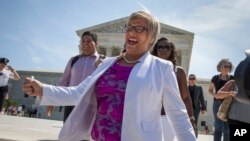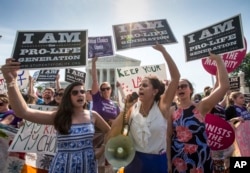Reaction to the U.S. Supreme Court ruling that struck down the restrictive Texas abortion law was swift here.
"The decision erodes states' lawmaking authority to safeguard the health and safety of women, and subjects more innocent life to being lost," declared Texas Governor Greg Abbott.
Attorney General Ken Paxton, who represented the state in the appeals process, said, "It is exceedingly unfortunate that the court has taken the ability to protect women's health out of the hands of Texas citizens and their duly-elected representatives."
The safety and cleanliness of clinics was also an argument made in favor of the law by anti-abortion groups.
"Abortion, which is a surgical procedure, would have to comply with the same regulations as other surgical centers. It makes complete sense, but the abortion industry, as Justice Thomas said in his dissent, gets a pass, the rules do not apply to them," Emily Horne, legislative associate for Texas Right to Life, told VOA.
Whole Women's Health, which is based in the Texas capital of Austin, was the plaintiff in the case brought before the court (Whole Woman's Health v. Hellerstedt). The abortion provider, backed by national groups like the Center for Reproductive Rights, argued that the Texas law only used the notion of protecting women's health as a mask for its real purpose, which was to make it as difficult as possible for a woman to get an abortion in Texas.
After the law, known as HB2, was passed in 2013, 75 percent of the abortion clinics that had been operating in the state closed.
Amy Hagstrom Miller, Whole Women's Health founder and chief operating officer, hailed the Supreme Court decision, saying, "We are thrilled that today justice was served and our clinics stay open."
Implications for other states
By avoiding a 4-4 split and ruling 5-3 to strike down the Texas law, the U.S. Supreme Court has issued a ruling that should apply to 10 other states with similar restrictions on abortion clinics. The state of Mississippi, for example, has only one clinic left in operation as a result of its laws.
"The Supreme Court sent a loud and clear message that politicians cannot use deceptive means to shut down abortion clinics," said Nancy Northup, president of the Center for Reproductive Rights.
According to a statement issued by the advocacy organization: "This decisive rejection of clinic shutdown laws marks the most significant abortion-related ruling from the Court in more than two decades, and will have national impact in states where similar laws threaten to shutter abortion clinics with medically unnecessary red tape."
But attorneys working with such groups say their progress will depend on each state's laws and how closely they match the Texas law.
One state that will likely be affected immediately is Wisconsin, which passed a similar law in 2013 that was struck down by a federal appeals court two years later. The state had appealed to the Supreme Court, but it now seems unlikely that the justices will take on that case, given that they have already ruled on the very similar Texas law.
In the Texas case, an appeals court had upheld the Texas law, so if the Supreme Court justices had tied, the law would have remained in effect.





